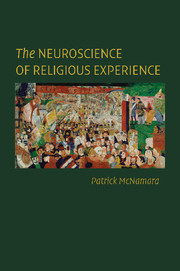Book contents
- Frontmatter
- Contents
- Preface
- Acknowledgments
- 1 God and the Self
- 2 On the Self and the Divided Self
- 3 Mechanisms and Dynamics of Decentering
- 4 Neurology of the Self
- 5 Neurology of Religious Experiences
- 6 Neurochemistry of Religiosity
- 7 Self-Transformation as a Key Function of Performance of Religious Practices
- 8 Self-Transformation through Spirit Possession
- 9 God Concepts
- 10 Religious Language
- 11 Ritual
- 12 Life-Span Development of Religiosity and the Self
- 13 The Evolution of Self and Religion
- References
- Index
8 - Self-Transformation through Spirit Possession
Published online by Cambridge University Press: 30 October 2009
- Frontmatter
- Contents
- Preface
- Acknowledgments
- 1 God and the Self
- 2 On the Self and the Divided Self
- 3 Mechanisms and Dynamics of Decentering
- 4 Neurology of the Self
- 5 Neurology of Religious Experiences
- 6 Neurochemistry of Religiosity
- 7 Self-Transformation as a Key Function of Performance of Religious Practices
- 8 Self-Transformation through Spirit Possession
- 9 God Concepts
- 10 Religious Language
- 11 Ritual
- 12 Life-Span Development of Religiosity and the Self
- 13 The Evolution of Self and Religion
- References
- Index
Summary
I am crucified with Christ: nevertheless I live; yet not I, but Christ liveth in me: and the life which I now live in the flesh I live by the faith of the Son of God, who loved me, and gave himself for me.
– St. Paul, Gal. 2:20; King James VersionNow we see in a mirror, in darkness; but later we shall see face to face. Now I know in part; but later I shall know as I am known.
– St. Paul, Cor. 13:12Introduction
One of the most ubiquitous phenomena in the world's religions is “spirit possession” or the taking over of the individual's identity and behavior by a supernatural agent. This “taking over” of the host's identity can be either a positive or a negative experience. When it is positive, as in St. Paul's case, personality is transfigured and the individual seems to be acting more freely and effectively. The “possession” seems to have made St. Paul more effective. St. Paul, after all, is considered by many to be a kind of cofounder of a world religion – Christianity. In all cases of positive possession, the new personality has left behind the old “nafs” or lower Self, created a new Self, and been given all of those “gifts of the Spirit” mentioned in Chapter 7. These gifts traditionally include some very fine character traits such as gratitude, generosity, compassion for others, fearlessness, clear strategic sense, joy, and many other qualities.
- Type
- Chapter
- Information
- The Neuroscience of Religious Experience , pp. 167 - 192Publisher: Cambridge University PressPrint publication year: 2009



